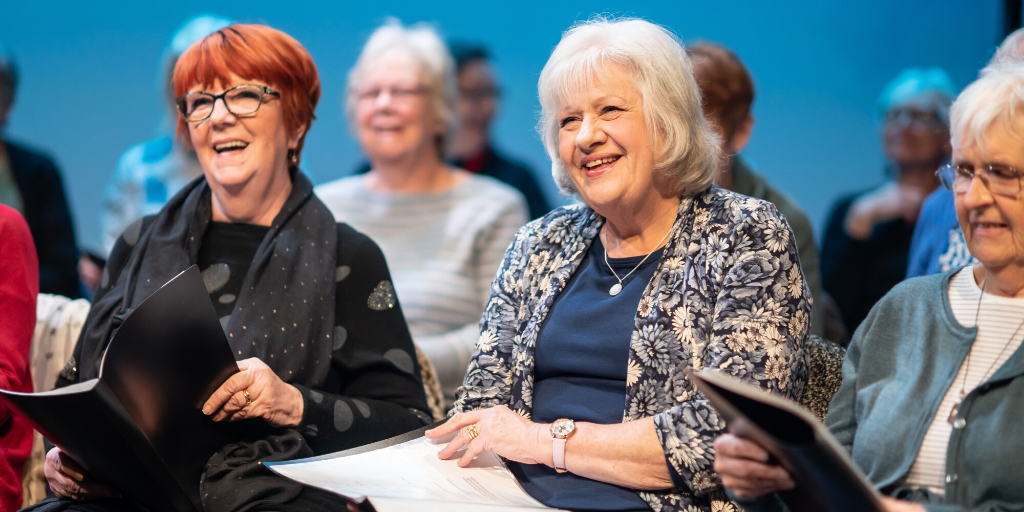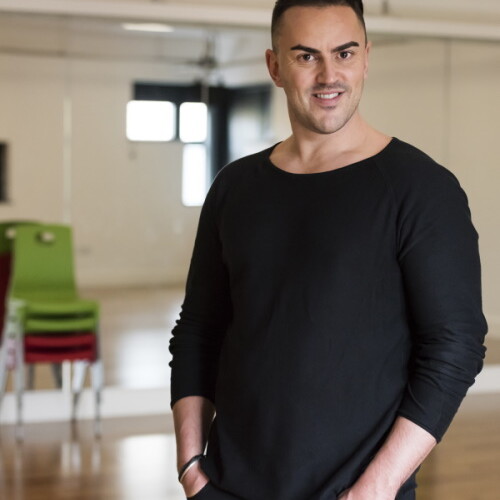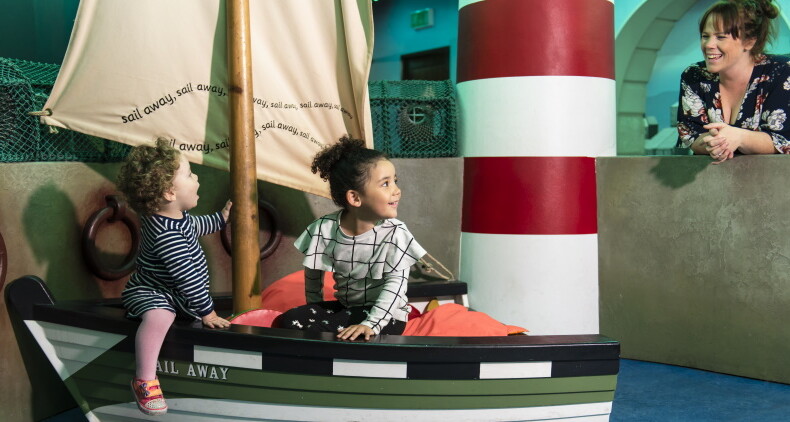Norwich Theatre:
Our journey towards being age-friendly across our venues
Norwich Theatre is one of the shortlisted organisations for this year’s Best Age-Friendly Cultural Organisation category, for their work with older audience members.
Our Age Friendly Approach
We are delighted to be shortlisted for the Best Age-Friendly Cultural Organisation award. This recognises our long-held belief that creativity and creative spaces are for every one and for every moment of their lives.
Norwich Theatre is at the centre of cultural life in our region. Norfolk has a large proportion of older adults and has seen a 31% increase in people aged over 65 in 15 years – an age group that is projected to increase at a greater rate in Norfolk than the rest of England. To reflect this, we commit to ensuring our venues are age friendly and that we offer working environments, activities and programming which focus on promoting healthy ageing, supporting older adults to be independent, resilient and well.
Our Learning
On starting our journey to become more age-friendly, we firstly prioritised co-production in service design, implementation and evaluation. We recognise that older people have a diverse range of abilities, needs and tastes, and challenge ourselves in not stereotyping our responses.
We pledge to always remain curious, to learn and to keep listening. We do this through formal and informal consultation, and apply our learning to continuously improve our offer. This journey to becoming ever more age-friendly is one that we do not believe will ever end, it continuously evolves and adapts.
We have learnt that being age-friendly is not about one particular strand of work. It is not solely about what we program, or about being physically accessible. It is all encompassing and always changing. It runs through every strand of our organisation. Learning to embrace an eternal and ever changing aim has been both challenging and rewarding.
We have looked at our artistic strategy, making changes to ensure we embrace work that articulates and celebrates life in older age. We have significantly broadened our participatory activities. Colleagues throughout the venues ensure we always offer a warm welcome, remaining vigilant to the difficulties some older visitors may encounter. We adapt our facilities where necessary, not just physically – adapting to external temperatures, offering affordable refreshments, providing visual stories. We have built partnerships throughout our communities, never underestimating the value of working with others who are better placed in providing expertise around social care.
We know that some older adults find the first step to our venues a difficult one. We remain inquisitive as to why this might be. We reached out purposefully to those who have never visited us, visiting them where they already were. We learnt the value of listening, and making cups of tea! Spending this time fostering relationships built on a desire to genuinely understand who you are speaking to is invaluable. We discovered that these conversations are more useful if they start with ‘who are you’ and ‘what would be of benefit to you’, rather than ‘how can we help’, ‘what can we do for you’.

Our Age Friendly Approach
We are delighted to be shortlisted for the Best Age-Friendly Cultural Organisation award. This recognises our long-held belief that creativity and creative spaces are for every one and for every moment of their lives.
Norwich Theatre is at the centre of cultural life in our region. Norfolk has a large proportion of older adults and has seen a 31% increase in people aged over 65 in 15 years – an age group that is projected to increase at a greater rate in Norfolk than the rest of England. To reflect this, we commit to ensuring our venues are age friendly and that we offer working environments, activities and programming which focus on promoting healthy ageing, supporting older adults to be independent, resilient and well.
Our Learning
On starting our journey to become more age-friendly, we firstly prioritised co-production in service design, implementation and evaluation. We recognise that older people have a diverse range of abilities, needs and tastes, and challenge ourselves in not stereotyping our responses.
We pledge to always remain curious, to learn and to keep listening. We do this through formal and informal consultation, and apply our learning to continuously improve our offer. This journey to becoming ever more age-friendly is one that we do not believe will ever end, it continuously evolves and adapts.
We have learnt that being age-friendly is not about one particular strand of work. It is not solely about what we program, or about being physically accessible. It is all encompassing and always changing. It runs through every strand of our organisation. Learning to embrace an eternal and ever changing aim has been both challenging and rewarding.
We have looked at our artistic strategy, making changes to ensure we embrace work that articulates and celebrates life in older age. We have significantly broadened our participatory activities. Colleagues throughout the venues ensure we always offer a warm welcome, remaining vigilant to the difficulties some older visitors may encounter. We adapt our facilities where necessary, not just physically – adapting to external temperatures, offering affordable refreshments, providing visual stories. We have built partnerships throughout our communities, never underestimating the value of working with others who are better placed in providing expertise around social care.
We know that some older adults find the first step to our venues a difficult one. We remain inquisitive as to why this might be. We reached out purposefully to those who have never visited us, visiting them where they already were. We learnt the value of listening, and making cups of tea! Spending this time fostering relationships built on a desire to genuinely understand who you are speaking to is invaluable. We discovered that these conversations are more useful if they start with ‘who are you’ and ‘what would be of benefit to you’, rather than ‘how can we help’, ‘what can we do for you’.
Our activities have changed as we listened. Altering the start time by just 30 minutes means participants can use their bus passes. Understanding varying interpretations of a ‘welcoming environment’, we facilitated a drop-in café based on a book club format. This offers the chance for someone to drop in with no commitment to speak, take part, or return; but rather the opportunity to participate how they wish. We have redefined family friendly activities to acknowledge it’s not just about parent/child and grandparents sometimes make the best playmates! We have learnt that some participants have danced, acted and sang professionally. They are extremely talented, and we welcome their facilitation skills within our work.
What’s next?
Covid-19 has brought with it immense challenges. Currently our venues are closed. Many of the older adults with whom we work were already experiencing loneliness. The recent social isolation we have all had to live with will have been incredibly difficult for them. We are planning a series of ‘pathway activities’ offering alternative interactions for the immediate term, and a bridge back to our more usual program as venues start to open.
We will continue to build partnerships. These are crucial, at a community level and across a growing network of funding partners, stakeholders and supporters. They help us to ensure we can achieve our commitments and ambitions to deliver excellence and accessible experiences.
We believe our work has a significant impact on older adults’ emotional, mental and physical wellbeing. We will focus on understanding and promoting this more, particularly regarding the positive impact our work can have on combatting loneliness, but we have much to learn.
As we all recover from the pandemic we believe we are a key partner in equitably bringing communities together around transformative cultural activity; whether this is through a community engagement programme, a social support and emotional wellbeing project, or physical and social activities that combat loneliness and isolation.
24 July 2022
FURTHER INFORMATION

Stephen Crocker, Chief Executive Officer of Norwich Theatre.
Norwich Theatre is one the UK’s leading performing arts organisations and the largest arts organisation in the East of England. Situated in the heart of Norwich, its charitable aims promote, maintain and improve life chances and wellbeing of individuals, and community cohesion and engagement.




